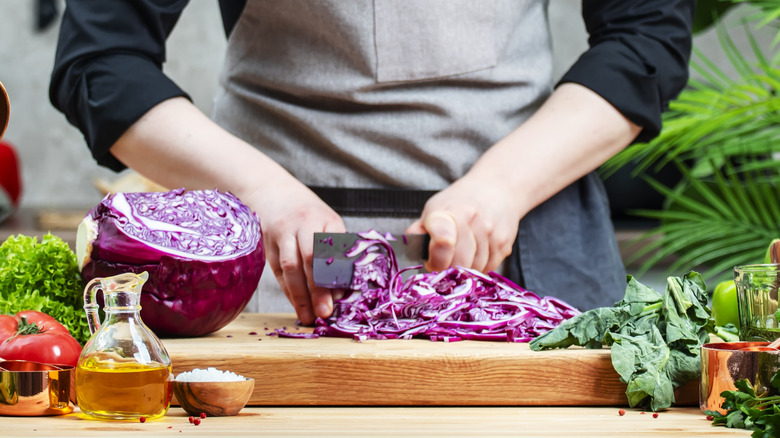Eating Cabbage Every Day Has An Unexpected Effect On Your Risk Of Cancer (But There's A Catch)
Cabbage is probably not at the top of most people's list of favorite foods, but you may find it added to some of your go-to dishes. Cabbage provides the base of coleslaw recipes that complement spicy barbecue sandwiches. Cabbage fills your egg rolls and adds some tang to your fish tacos. And let's not forget that fermented cabbage — sauerkraut — that goes so well with some of your heavy meats like sausage.
You may want to turn to cabbage a little more often, says Live It Up Registered Dietitian Lena Bakovic. "Cabbage contains antioxidants, as it is a cruciferous vegetable," she said in a Health Digest Interview. "Antioxidants work to scavenge free radicals and reduce oxidative stress in our bodies, which we know is connected to cancer risk."
Even if you don't like cruciferous vegetables like cabbage, eating just one serving a week may be enough to reduce your risk of some cancers, according to a 2012 article in Annals of Oncology. Specifically, it may significantly reduce your risk of cancers of the oral cavity, esophagus, colorectum, breast, and kidney.
However, don't assume you can prevent cancer just by eating cabbage every day. "On its own, as a single food, I would not feel comfortable making this statement that cabbage alone decreases cancer risk," Bakovic said. Still, it's helpful to understand how cabbage and other cruciferous vegetables work to fight cancer.
How cruciferous vegetables fight cancer
When you eat cruciferous vegetables like cabbage, broccoli, and Brussels sprouts, your body breaks down natural compounds in them into powerful cancer-fighting substances, including indoles and isothiocyanates. These substances have been shown to help prevent cancer in several ways, according to a 2015 article in Current Pharmacology Reports.
One type of isothiocyanate, called PEITC, can help protect lung cells from damage caused by smoke. It does this by controlling small gene regulators that are involved in how cancer starts and grows. Another well-known isothiocyanate, sulforaphane, activates enzymes in the body that may shrink tumors and stop cancer cells from growing. Sulforaphane also blocks certain enzymes that control whether cancer-related genes are turned on or off.
Indoles, like indole-3-carbinol (I3C), play a different but important role. I3C helps the body process estrogen in a healthier way, which is especially important in hormone-related cancers such as breast cancer. It also acts as a natural antioxidant, protecting cells from damage and helping to prevent tumors in both the breast and prostate.
Some tasty and healthy ways to eat cabbage
Aside from those cancer-fighting phytochemicals, cabbage is low in calories, with just 22 calories per cup. You'll also get a healthy dose of vitamin C and folate. "Cabbage is a high-fiber food, which in this role may improve digestive health and colorectal cancer risk if it is otherwise also combined with a dietary pattern rich in whole foods, fruits and vegetables, whole grains, and lean sources of protein in addition to regular physical activity," Bakovic said.
Among some of the many ways to eat cabbage, Bakovic said cabbage soup is one of her favorites. "I make mine with vegetable broth and throw in any other veggies that I may have in the house," she said. "Cabbage soup can be made in so many different ways and to suit personal tastes." She also recommends including cabbage in stir-fries and salads or sauteeing cabbage for a side dish. Juicing cabbage may prevent heart disease and reduce inflammation.
You can also try fermenting cabbage for a sauerkraut or kimchi dish. "The fermented form of cabbage also provides benefits to gut health, in that it contains beneficial bacteria, otherwise known as probiotics," she said.


